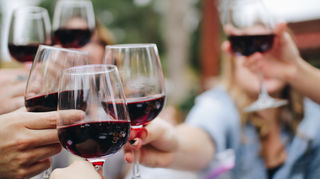Alcoholism
Can Red Wine Reduce Your Risk for Alzheimer's?
Weighing resveratrol's antioxidant effects against risks of alcohol consumption.
Posted September 26, 2019 Reviewed by Matt Huston

Alcohol is a toxic liquid infamous for impairing judgment, concentration and coordination, yet we often read headlines telling us that red wine is good for the brain.
Think about it. When was the last time you went to your primary care doctor, neurologist or psychiatrist for help with a brain symptom such as memory lapses, difficulty concentrating, or confusion, and were diagnosed with Alcohol Deficiency Disorder?
Doctor: “Your problem, Mrs. Williams, is that you don’t drink. The human brain requires alcohol to function at its best. Go home, start drinking regularly, then come see me again in three months.”
This ludicrous recommendation never comes from the mouths of experienced clinicians who understand all of the ways in which alcohol endangers health. It comes from headline-grabbing studies designed to make wine look like a health food. These studies make the news because we desperately want to believe that the solution to our Alzheimer’s epidemic may be as simple as enjoying a glass or two of red with dinner—a classic example of wishful drinking.
Funny how we rarely see media messages promoting beer, vodka or whiskey for brain health—it’s almost always red wine. Why is that?
What separates red wine from most other alcoholic beverages is the presence of resveratrol, a compound lurking within grape skins which is supposed to have antioxidant properties. Is this true? If so, is drinking red wine to reap the alleged benefits of its resveratrol content worth the very real risks posed by its alcohol content?
What Is Resveratrol?
Resveratrol is a fungicide that grapevines produce to fight against gray mold (Botrytis cinerea) infection. When gray mold encroaches upon a grape, resveratrol sets to work dismantling its membranes—crippling its invasive capabilities by completely destroying its vital cellular components from the inside out. When resveratrol is finished with the poor, unsuspecting fungus, "no recognizable cellular structures are visible except ghosts of mitochondria." [Adrian and Jeandet, 2012]
How might this dastardly molecule hold the secret to better brain health? Those placing their hopes in resveratrol point to its antioxidant properties, which theoretically could protect brain cells from damaging oxidative stress. Oxidative stress is an important root cause of many brain diseases, including Alzheimer’s disease.
What Does the Science Say?
The lion's share of studies about red wine and public health have been epidemiological studies—many of which have suggested red wine might be associated with lower risks of various conditions such as heart disease. Unfortunately, epidemiological studies are not scientific experiments; they are questionnaire-based guesses about how foods and beverages might affect our health. This method of studying nutrition is notoriously flawed and at best only capable of generating hypotheses that then need to be tested in experiments to see if they deserve serious consideration. So, let’s focus instead on interventional studies—experiments designed to test the effects of substances on cognitive health.
Most of the hopeful headlines we see were inspired by the following three interventional studies:
Study #1: In the journal Nature, researchers at the University of Rochester published a study examining the effects of different doses of alcohol on the brain. In their conclusion, they suggest that people who drink some alcohol may be better protected from dementia compared to those who don’t drink at all. How did they arrive at this viewpoint?
In these experiments, mice (yes, mice) had pure alcohol (not wine) injected into their abdomens (presumably because no self-respecting mouse would voluntarily drink pure alcohol). Mice receiving “low” doses (equivalent in human terms to about 2-1/2 glasses of wine per day!) had increased fluid flow through their brains and smaller amounts of one brain cell protein called GFAP. Increased brain fluid circulation was viewed as a good thing because it might help to clear the brain of toxins that can accumulate in dementia. [Another possibility not mentioned is that perhaps brain fluid flow increases in response to alcohol in order to flush the toxic alcohol out of the brain . . .]
Despite the fact that this was not a study of red wine, resveratrol, humans, or dementia, and despite the authors stating explicitly in the body of their paper that “Naturally, this study performed in mice should not be viewed as a recommendation for alcohol consumption guidelines in humans”, headlines like these emerged:
"Drink Up: New Study Concludes Wine Can Offset Dementia" (Mental Floss)
"A Couple Glasses of Wine a Day Helps Clean the Brain" (NY Daily News)
Study #2: A UCLA study published in the journal Experimental Gerontology reported a “protective effect of grapes against early pathologic metabolic decline” presumably due to the presence of multiple antioxidants within grapes, including resveratrol.
In this small study, people with mild cognitive decline were given a drink containing either a freeze-dried grape powder or a placebo powder twice a day for six months. Those receiving the grape powder had higher metabolic activity in certain areas of their brains, but no significant improvements in their cognitive tests. [Unfortunately, the authors did not disclose the ingredients of the placebo powder except to say that it contained the same amount of fructose and glucose as the grape dust, so even if the grape dust brought brain benefits, the question would remain: compared to what?]
Funded by the California Table Grape Commission, this research had nothing to do with alcohol in general or red wine in particular, yet if you type “red wine Alzheimer’s” into Google’s search box, the #1 result that pops up is this headline, referring to this same powdered grape study:
"Red Wine Consumption Could Fight Dementia" (Wine Spectator)
Study #3: The most rigorous study conducted on this topic was a multi-center phase two clinical trial led by researchers at Georgetown University, published in the journal Neurology. It’s main conclusion was that “resveratrol is safe, well-tolerated, and alters some [Alzheimer’s disease] biomarker trajectories.”
In this double-blind, randomized study, 119 people with mild to moderate Alzheimer’s disease were given either capsules of a synthetic resveratrol supplement or a placebo every day for a full year.
The study yielded confusing results. In the resveratrol group, one molecule associated with Alzheimer’s disease dropped, while others were relatively unaffected. Responsibly, the authors commented “The altered biomarker trajectories must be interpreted with caution. Although they suggest [central nervous system] effects, they do not indicate benefit.”
Perhaps most concerning was that total brain volume in the resveratrol group was smaller. The authors are unsure why this occurred, and shrinkage did not seem to negatively affect brain function. [Had this been a red meat experiment, one can only image the headlines . . .]
Two years later, a second paper was published about this same study, looking at additional markers of brain health. In the resveratrol group, some markers of inflammation rose, while others fell. People taking resveratrol appeared to suffer smaller losses in cognitive performance and daily function.
Although this research was also not about alcohol or red wine, the following is one of the headlines that ensued:
"Red Wine Molecule May Slow Alzheimer’s Symptoms, Study Finds" (Fox News)
The Truth About Resveratrol and Red Wine
None of these experiments studied human beings, with or without dementia, drinking red wine in any amount, and therefore none of these studies can be used as a reason to drink red wine for dementia prevention. In fact, I am not aware of any studies testing the effects of red wine itself on humans at risk for dementia.
If you are encouraged by the confusing results of the resveratrol studies and are considering drinking red wine as an enjoyable way to get your resveratrol, consider the following:
- Doses used in the study described above were 500 to 2000 milligrams per day. To reach even the low end of that dose range, you would have to drink more than 19 gallons of wine per day, because the typical glass of red wine contains just one measly milligram of resveratrol.
- Resveratrol is believed to “work” by fighting oxidative stress. Unfortunately, that lonely milligram of antioxidant in your wine glass is swimming in five ounces of wine, which contains 3/4 of an ounce of alcohol, a powerful promoter of oxidation.
- Regular alcohol consumption can lead to tolerance and addiction in many people, eventually making it difficult to control how much is used.
- Alcohol can damage the liver and gastrointestinal tract, increase risk for falls, cloud judgment, and contribute to depression and anxiety. Alcohol predictably disrupts healthy sleep patterns which may increase risk for dementia.
If you decide to pass on the wine and reach for a resveratrol supplement instead, consider the following:
- The little-known secret about most polyphenol antioxidants, including resveratrol, is that the human body appears to treat them more like threatening toxins than health-boosting nutrients. Instead of welcoming resveratrol with open arms, we immediately transform 99.72% of it into metabolites to be flushed out in the urine, making it extremely difficult for intact resveratrol to reach the brain. Despite taking colossal doses of up to 2000 milligrams per day, resveratrol levels in the brains of people in Study #3 were barely detectable (0.45 nanograms/ml on average—a nanogram is one million times smaller than a milligram).
- Although resveratrol is generally well tolerated by most, supplements can cause nausea, diarrhea and weight loss in some individuals.
In many ways, the red wine story mirrors the story of Pom Wonderful, a brand of pomegranate juice marketed in the U.S. as an anti-aging, disease-fighting elixir packed with powerful antioxidants. The fact is that those antioxidants are virtually impossible for us to utilize and are accompanied by a whopping 32 grams of sugar, a powerful promoter of oxidation. In both cases, we’re told that drinking something unhealthy is good for us simply because it contains a smidgen of a colorful, albeit impotent, plant antioxidant with dismal bioavailability and questionable health benefits. (For more, see my post "The Antioxidant Myth.")
Earlier this year, the FDA cracked down on supplement companies trying to exploit consumer fear of dementia for profit, despite the fact that “no supplement has ever produced a clear benefit for [Alzheimer’s disease] patients in pivotal trials. Ginkgo biloba, the omega-3 fatty acid docosahexaenoic acid, B vitamins, vitamin E, selenium, and resveratrol have all fallen short.” [Alzforum.org 3/10/19]
if you are curious to learn more about this famous little molecule, Long Island University pharmacy Professor John Pezzuto chronicles the history, science, and marketing of resveratrol, including its potential benefits for certain conditions, in this 2019 paper.
To Drink or Not to Drink?
That is the question. In 2018, The Lancet published a reconsideration of the epidemiological studies which have long suggested benefits of moderate alcohol consumption. The authors concluded that the potential risks of even light drinking far outweigh any potential benefits, and therefore “no level of alcohol consumption improves health.”
Interventional studies of light to moderate drinking are unfortunately few and far between, therefore the risks of having a glass or two of wine with dinner are poorly understood. It is up to you to carefully consider the risks in your particular case. If you choose to drink red wine, do so because you enjoy it, rather than because of unfounded assertions that it's good for your brain.
To learn more, see my post “Avoiding Alzheimer’s Could be Easier than You Think."
Facebook image: YAKOBCHUK VIACHESLAV/Shutterstock




